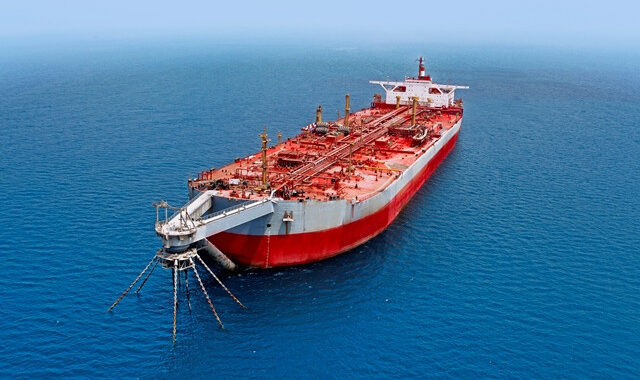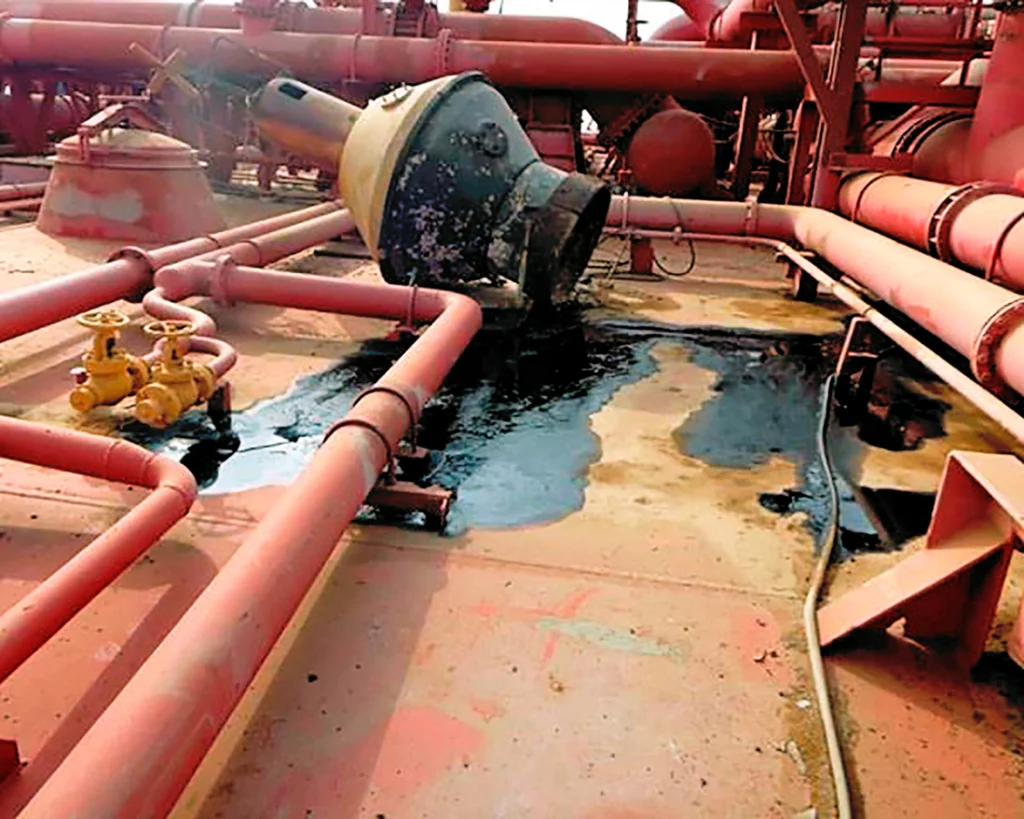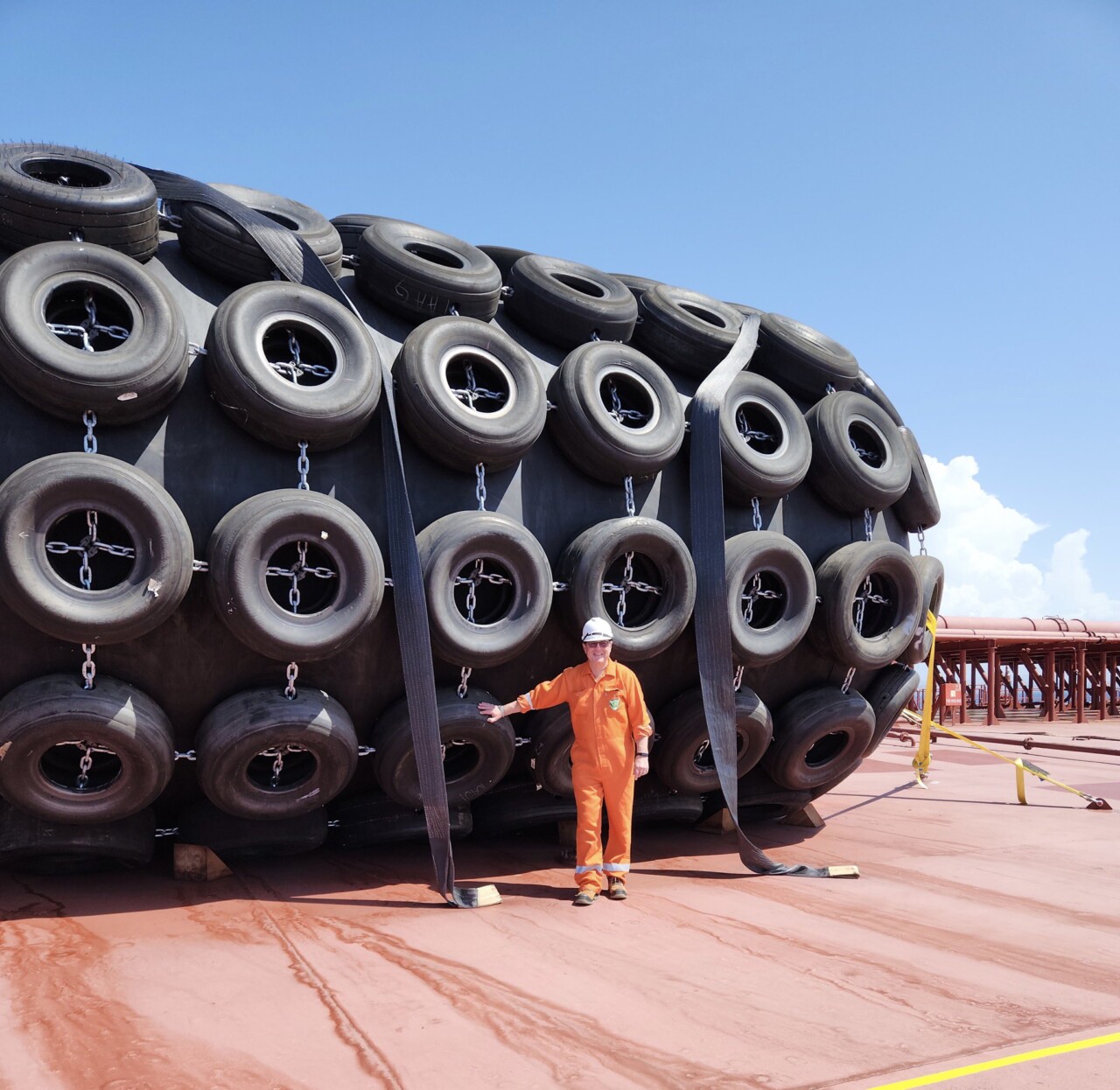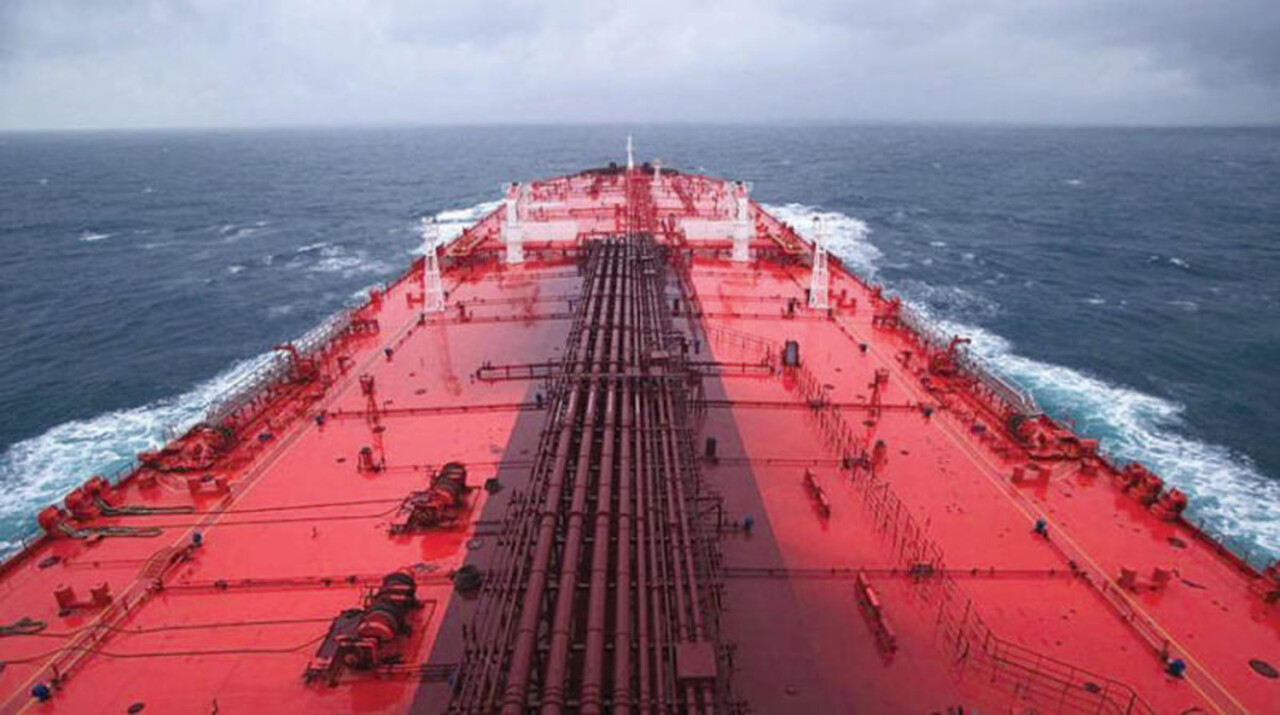Yesterday the salvagers from Smit salvage set sail with their salvage ship Ndeavor from Djibouti, a port city in the Horn of Africa. The ship will arrive today or tomorrow at Ras Isa, a cape on the westcoast of Yemen, to inspect the old and rusty oil tanker Safer.
As soon as the green light is given VLCC Nautica, a second-hand supertanker that came sailing from China to Djibouti in the past weeks, will anchor alongside. Over the next six to eight weeks the Dutch salvagers will pump over one hundred and fifty million liters of oil from the Safer into the Nautica, to protect the Red Sea from an unparalleled disaster.
“Pumping oil is our core business,” Boskalis spokesman Martijn Schuttevaer says. “Although we don’t exactly know what we will encounter on the Safer, such as vapors and flammable gases.”
Safer declared safe from inflammable gasses & vapors.. Catch (or contribute to) the latest news on the FSO-Safer salvageblog
Sixty more salvagers will soon fly in from Rotterdam, to help preventing the often announced oil disaster. Later this week the local UN office will hold a press conference. In addition to tense announcements about the cooperation of the Houthi’s, news is expected about the last required twenty million for the salvage operation totaling 148 million dollars.
Difficult fundraising to prevent oil disaster
The latest donation was three-quarters of a million dollars, two weeks ago, from Denmark. Earlier pledging events have so far raised over 105 million dollars for the operation, spearheaded by the UN, the Netherlands, and the UK. The US, Germany, and Saudi Arabia also contribute significantly, followed by a series of countries with smaller donations, from Malta to South Korea.
The UN collected another quarter of a million dollars from ordinary citizens worldwide, through a fundraiser last year. The IOGP -umbrella of oil and gas producers- donated ten million dollars. Despite repeated appeals to the sector, only four individual companies came forward with donations: Trafigura foundation one million dollars, Yemen’s multinational HSA just over a million, plus half a million from the Fahem Group, the Yemeni company that mediated between the UN and the Houthi administration in Sana’a to get the salvage plan approved.
Shortly before the weekend, the oil company Octavia – a full subsidiary of HSA – donated another three hundred thousand dollars. According to boardmember Darran Lucas: “The right thing to do. Because we are a Yemeni family and involved with the country.”
Octavia extracts oil in Hadramawt, a province in the southeast of Yemen, far from Houthi territory. Together with the Austrian OMV, Octavia is the last active oilcompany in Yemen. All other oil blocks lay idle, due to threats from the Houthi’s, who want to share in the revenue. Successful drone and rocket attacks last autumn on oil sources and export ports along the south coast contributed to the severity of the threats.
The UN has asked Octavia and HSA to encourage other companies in the sector to make donations, Lucas says. ‘Companies are afraid of liability, but the UN has apparently resolved those legal issues. There’s still 20 million dollars needed. It’s not a huge amount, we should be able to cough it up together.’
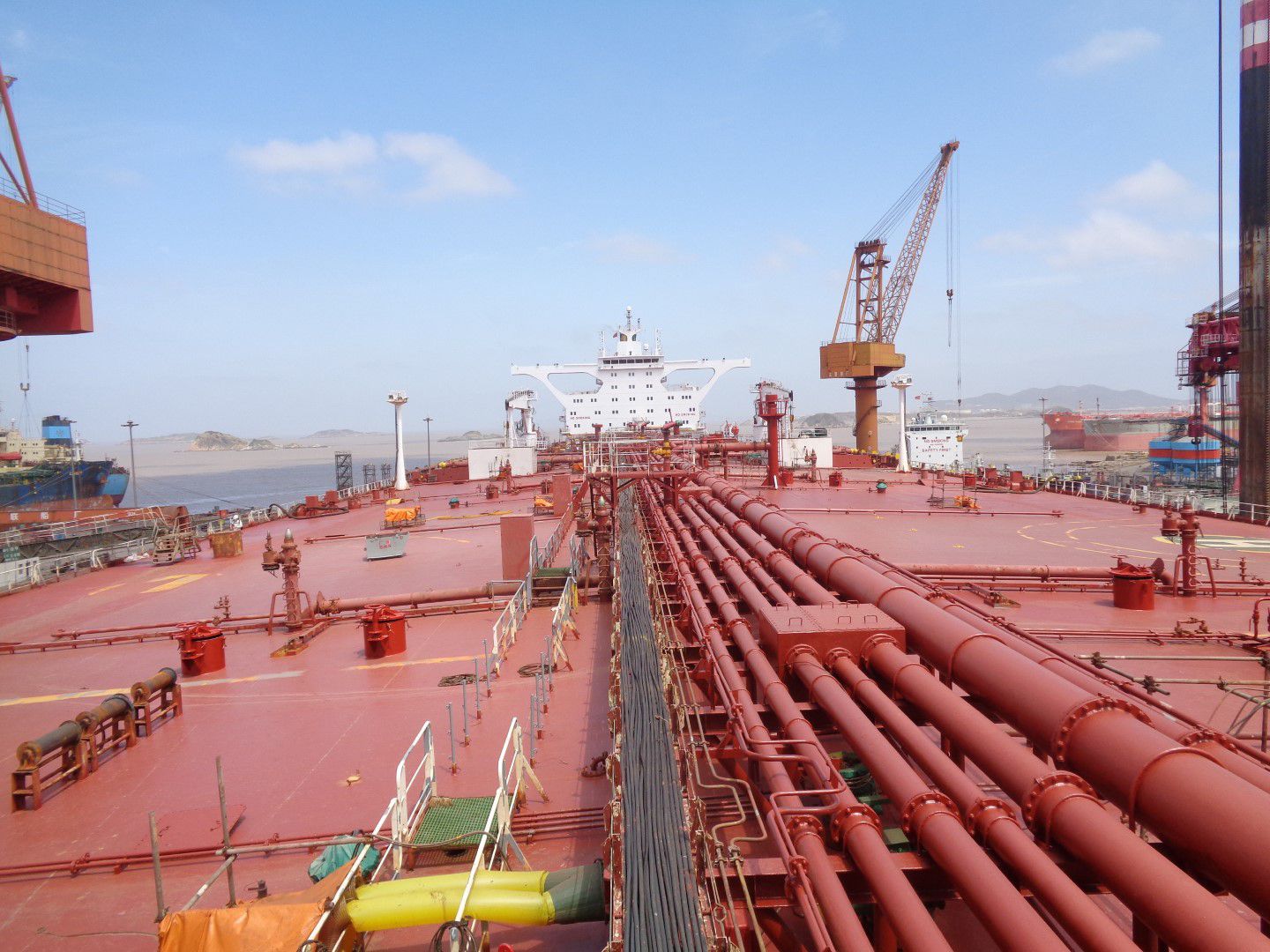
VLCC (Very Large Crude Carrier) Nautica, the tanker that the UN purchased to pump the oil from the Safer
Whether money is really the problem is doubted by Yemen watchers. Among them, the Houthi regime is considered notoriously unreliable, having broken numerous previous agreements, according to Yemen expert Fernando Carvajal in an interview last year. ‘You will see that the Houthi’s will use this as a cash cow. After every phase, enforce new commitments, or simply ask for money, for providing security teams, for delivering armored vehicles, for everything.’
Unpredictable Houthis delayed and thwarted previous operations
The UN previously tried to prevent the often predicted oil disaster in 2019 and 2021, by patching up the Safer for significantly less money. Both operations were canceled at the last minute, due to a lack of trust between the UN and the Houthis, who have been ruling Sana’a since 2015 and have steadily transformed North Yemen into a new theocracy, in the image of the millennial ‘imamate’ under which their Hashemite ancestors ruled North Yemen until 1962.
Darran Lucas from the oil company Octavia does not believe the Houthis will interrupt the operation. ‘That wouldn’t be in their favor. In my conversations with our chairman, I don’t hear such a danger exists. I hear instead now is a good opportunity to pump out the oil and defuse the danger.’
Among potential donors, there is resistance to providing a new storage ship to the Houthis, free of charge. The ship will legally be transferred to SEPOC, Yemen’s national oil company, once it reaches Ras Isa. Formally, SEPOC is owned by the previous – de jure – government of Yemen. This government was ousted to South Yemen in 2015 and has since dispersed further to Saudi Arabia, the UAE, and the rest of the world. It has been waiting in vain for eight years for the fall of the Houthi regime and plays an increasingly marginal role in Yemen.
De facto SEPOC’s northern assets have been in the hands of the Houthis for eight years, until recently a pariah on the world stage. However, since the Saudi royal family switched to diplomacy last April after seven years of war, the Houthis are beginning to feel recognized as representatives of North Yemen. The plan with the Safer was designed in this calm. These days, Houthis are no longer identified as ‘rebels’, but as the De Facto Authority (DFA).
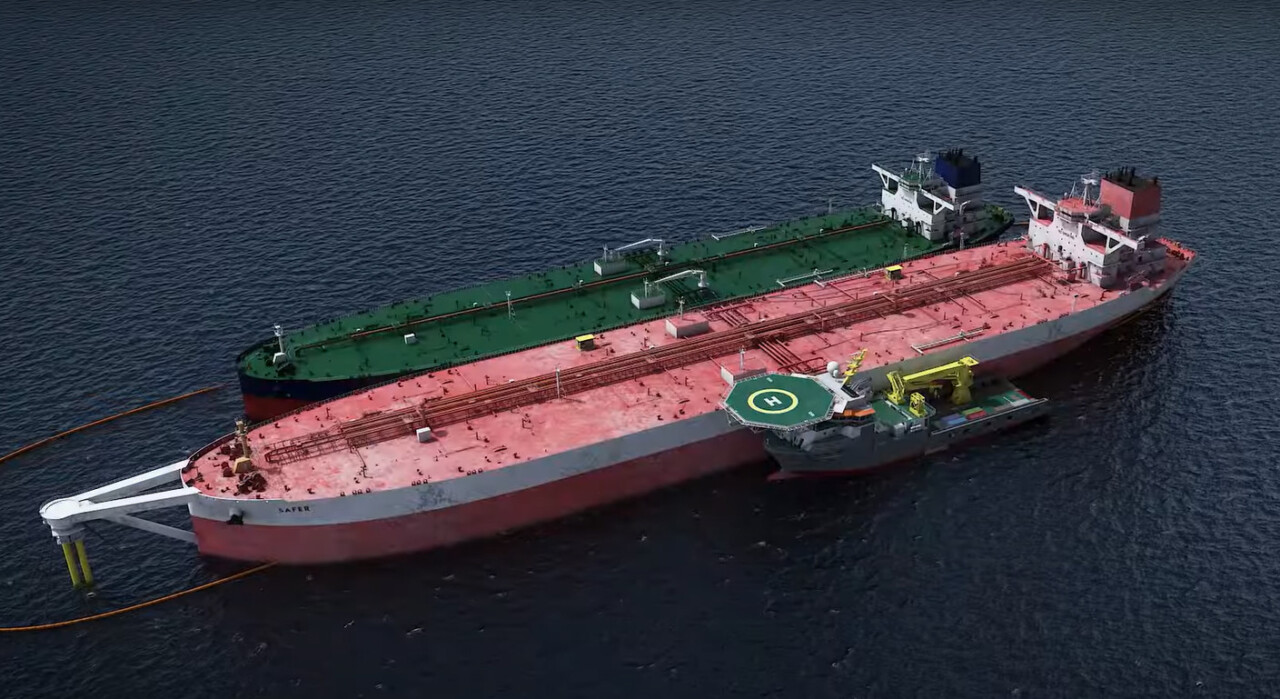
Impression by Boskalis of how the ships Nautica and Ndeavor will be positioned next to FSO Safer in June
The UN now bets this DFA, confronted with so many accomplished facts – a solid plan, a new tanker, nearly one hundred and fifty million dollars, a salvage ship, a contract with a reputable salvager – will think twice before squandering the painstakingly built credit again. That this credit is so far insufficient was demonstrated by a contract that the DFA concluded last week with a Chinese company, which was cancelled on orders of the Chinese government a day later.
Diplomats see the salvage operation in North Yemen’s territorial waters as the first test in a long series for the Houthis and their DFA. By actively cooperating in averting an oil disaster, the Houthis can prove that they are responsible enough to begin to transform from a pariah state into a regular country.
The only question remains whether the calm will last long enough to carry out the plan. On the one hand, the operation only needs two months; on the other hand, there has been little progress in the peace of Yemen, since the euphoric exchange of prisoners at the beginning of April. New dangers lurk.
The Houthis see the ranks among hostile Yemeni factions in the south closing in such a way that the legitimate government, marginalized by internal conflict, is no longer the future enemy of the Houthis; the southern independents will sooner or later take their place. This is worrying for the Houthis, whom are eyeing the oil in the south to finance their state.
As they see this future evaporating, the warlike language towards all enemies increases, including towards Saudi Arabia. A split in the south would seriously obstruct a viable state in North Yemen, hence the warlike language. Last week, the south announced the name of the new southern republic. It will not be South Yemen as before, or the alternative South Arabia, but دولة حضرموت: State of Hadramawt, named after the largest province, rich in oil, history and a diaspora of over fifteen million souls, scattered all over the world.
Some see developments in Yemen even igniting a simmering conflict between Saudi Arabia and the United Arab Emirates (UAE). Since the rapprochement between the Saudi and North Yemeni royal houses – the Houthis see themselves as such – the UAE, bypassed in recent negotiations, is increasingly focusing on its relations and vassals in South Yemen. According to analyst Farea al-Muslimi, the recent escalation could even lead to a violent confrontation, not necessarily limited to Yemen.
What’s wrong with the Safer oil tanker and now will the salvagers solve the problem?
FSO Safer is a supertanker of roughly four hundred by seventy meters. The Safer is located at Ras Isa (راس عيسى ‘Cape Jesus’), off the west coast of Yemen, and has served as offshore oil storage since 1988, because North Yemen lacks an export facility on land. Maintenance on the old, single-hulled tanker, costing 25 million dollars annually, has been halted since the Houthis took over the capital Sana’a in August 2014 and war broke out in Yemen at the beginning of 2015.
A core team of five to seven people on board the Safer has prevented several minor accidents, but the old ship – which sailed as the supertanker Esso-Japan for ten years across the world’s seas – is in deplorable condition after eight years without maintenance. The ship is one-third filled with oil: 1.1 million barrels, or 185 million liters of crude oil, but the exact content after eight years of war is uncertain.
In particular, there is fear of a gigantic explosion of the ship, which has been accumulating gases for years. An explosion, rupture, or other accident could be disastrous for the unique and vulnerable ecology of the Red Sea, with species that have already adapted to the warm, salty water, which makes the isolated Red Sea ahead of other world seas, which still have that process to go through due to climate change.
Whichever scenario comes true, beyond the coral reefs directly around the ship, the disaster can extend to tens of millions of already starving people on both shores of the Red Sea, hundreds of thousands of hectares of sooty agricultural and horticultural land, hundreds of kilometers of dying mangroves along the shores of the Red Sea and its islands, massive fish deaths in its waters, and thereby tens of thousands of impoverished fishermen and their extended families.
Obstructed world trade
Both the Suez Canal on the north side and the Bab al-Mandab on the south side of the Red Sea can become obstructed indefinitely, with all the consequences for the world economy, see giant containership Ever Given, which in 2021 drove suppliers worldwide to despair after it got stuck in the Suez canal.
Both in 2019 and 2021, the UN attempted to patch up the Safer, but both operations were cancelled at the eleventh hour due to a lack of trust between the UN and the Houthis, the theocratic regime that has held the scepter in North Yemen, including Ras Isa, since 2015.
‘Literally the night before the day we were to set sail from Djibouti, the Houthis called it off,’ said UN negotiator Ratcliffe at the time. ‘The UN had changed the list of work to be done at the last minute,’ Ibrahim al Seraji, negotiator on behalf of the Houthi regime in Sana’a reacted. ’They kept coming with new people, new visas, different passports. Of course, we need to know who we are admitting.’
Last year, the UN and the Houthis agreed on a new plan, in which the UN transfers the oil to a new tanker. The contract explicitly states that the Houthi regime ‘must provide all facilities for the success of the operation’ but carries neither costs nor responsibility. The UN needed three fundraising events over the past year to raise the millions needed for the job.
Due to the increased value of oil tankers, the budget has since risen to 129 million, with an additional 19 million for phase 2, in which the old tanker is towed to a location where it can be responsibly dismantled. This includes the yield (20 million dollars) from the metals (scrap value) from the old tanker. What happens to the oil in the Nautica – the value of which fluctuates between 50 and 100 million dollars – has not been agreed upon, partly because it is unclear about its quantity, quality and the de jure and de facto owners of the ship and its contents.
Desperate UN resorts to creating accomplished facts
Earlier this year, the UN decided to create a fait accompli by purchasing a double-hulled tanker from 2008 for 55 million from the Belgian shipping company Euronav. The VLCC Nautica has been sailing from East China to Djibouti in the past few months.
At the end of April, Boskalis was then contracted for the job of transferring the oil, for 35 million dollars. Salvagers from Boskalis subsidiary Smit salvage have been assisting the UN for years with advice and research, free of charge, up to a visit to Ras Isa itself. The Houthis so far haven’t allowed the engineers on the ship, so its current state is unknown.
‘It was mainly brainstorming for a long time, without compensation,’ says Martijn Schuttevaer, spokesperson for Boskalis. ‘Now we have this contract.’ According to Schuttevaer, the job is not overly complex and the operation will take between six and eight weeks. ‘Pumping oil is our core business, but we don’t know exactly what we’ll find in terms of fumes and flammable gases.’
A team of experts must first neutralize these flammable gases by introducing inert gas. Then, the oil will be carefully and evenly pumped from the different compartments of the tanker. Whether Smit salvage will be towing away the old rusty tanker is unclear, also because it has not yet been determined where the Safer will be dismantled. ‘We disconnect it and prepare it. We can also tow it, but there are no agreements or contracts about that yet.’
Other specialized companies have been contracted to connect the new tanker to the pipeline, through which no oil has flowed from Yemen for eight years because the war, during which the 438km-long pipeline into the Marib oilblocks, central Yemen, has been severly damaged in several places.
Yet other companies have been contracted to ensure safety for the operation, although coordination is through the UN, says Schuttevaer. ‘The UN is the one that has to convince us of the safety, we have no contact with the DFA about that. We will continue to monitor this ourselves, as it is a very important topic.’
*article translated by bot, excuse for Dunglish and loss of nuance

